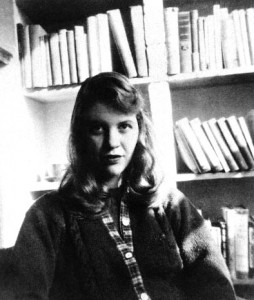Discussion Questions for The Bell Jar
by Olivia-Beate Franzini
- The Bell Jar has sold over two million copies in the United States and has been titled the Catcher in the Rye of its time, an archetypal novel on personal experience. However, do you agree with Frances McCullough that it may have never achieved such success throughout the world had Plath not committed suicide? Or is it the subject matter alone that gives it its appeal?
- Throughout our studies in this course we have discussed the topic of truth and the blurring of lines between fiction and non-fiction. Sylvia Plath herself regarded the text as an “autobiographical apprenctiwork, or a confession, which she told A. Alverz she needed to write in order to free herself from her past. How much does our fixation on truth shape our reading of the text? Does it matter at all?
- The Bell Jar is often labeled as a feminist text, what aspects of it make it a feminist text and what universalities does Plath present? Besides being classified as a feminist text, it is also one that is sometimes labeled a text about mental illness. Do you find this label to be accurate? Is the novel really about mental illness as much as it is about the effect of society’s expectation of women?
- Despite the popularity of The Bell Jar and the way it speaks to human nature and the feeling of femal entrapment, critics have often titled it a “flawed first novel.” Do you think these claims can be justified?
- Being that the novel parallels quite closely with the concept of scriptotherapy, therapeutic writing to facilitate a resolution to distress from trauma, what did Plath gain by leaving the ending ambiguous and up in the air for Esther? How could the novel’s ending be symbolic for Plath?


